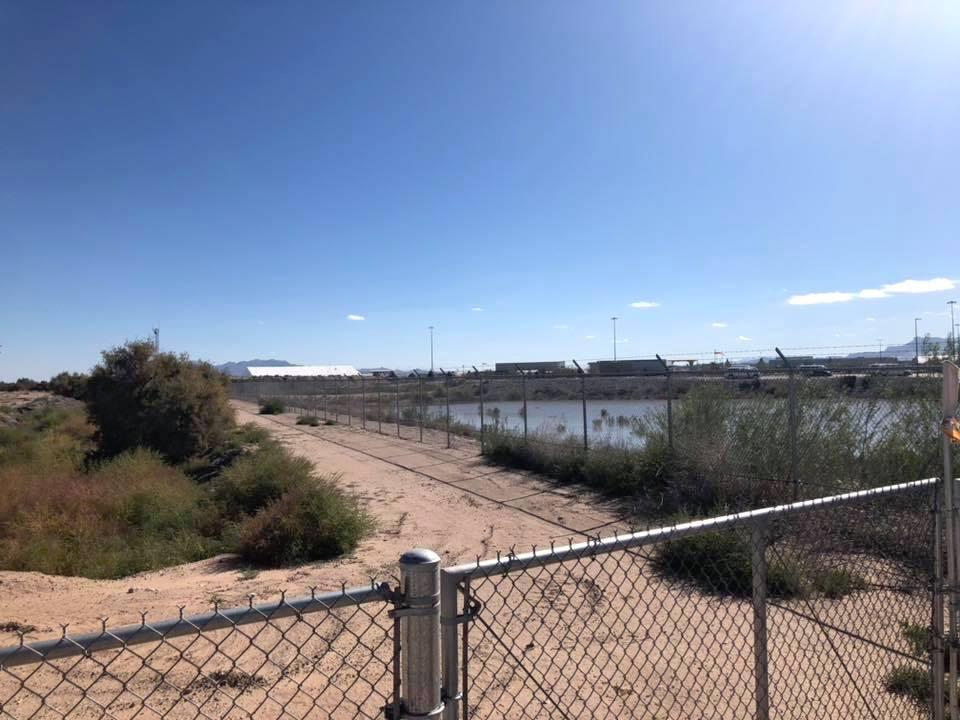
The tent city at Tornillo can be seen in the distance, behind a chain-link fence. The facility holds immigrant children who are separated from their families, including unaccompanied minors who crossed the U.S. border. The facility opened in June and initially was expected to close in July; it is still open and has expanded. Peter Zimmerman photo
In tents, in Tornillo
Over the summer, the federal government built a tent city in the border town of Tornillo to house immigrant children separated from their families. In June, the Texas Tribune and El Paso news media reported that authorities said the facility probably would close by the end of July. In July, media reported that the facility would stay open another month. In August, the El Paso Times reported that authorities had said the facility would close in 30 days and would not increase its capacity. In September, The Associated Press reported that the tent city would stay open until the end of the year and expand its capacity from the original 360 to 3,800. More recent reports say the facility will remain open into 2019. And as the closing day for the tent city keeps moving forward, the story of Tornillo has largely been forgotten amid headlines about the midterm election, migrant caravans, troop deployments and other events.
High-profile protests, including a Father’s Day march, occurred at Tornillo over the summer. And though the camp might not be in the national spotlight now, protests are returning to the tent city as small groups and individuals travel from around the country — including Central Texas — to Tornillo to make sure the children there are not forgotten.
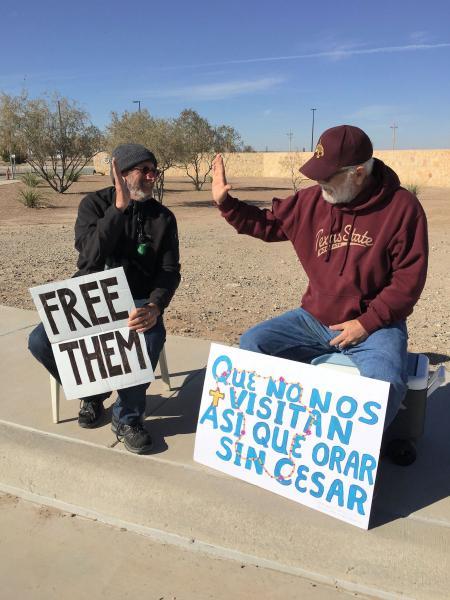
Joshua Rubin (left) and Joe Yuracka talk as they hold signs outside the tent city in Tornillo. Photos submitted by Cat Yuracka
The scene at Tornillo
Tornillo is being used as something of a clearinghouse for children from around the country that have been filled to overflowing with unaccompanied minors — children and teenagers who crossed the border without parents. The New York Times reported that since May, shelters typically used to detain unaccompanied minors have been at about 90 percent capacity. Children are often sent to Tornillo while officials look for family members in the United states to send them to — a process that is often not a short one.
“I was there to witness something my heart and head say is wrong. That was my word as I went..”
- Pete Zimmerman
The Times reported that while the shelters the children are being moved from are monitored by state agencies and require regular schooling, the tent city is considered an “emergency shelter” and is not as regulated — nor is schooling required. Access to legal services in Tornillo is also limited compared to the access available in other shelters.
Activists, including Cat Yuracka and her husband Joe from San Marcos and Pete Zimmerman, a chaplain from San Antonio, have traveled to Tornillo to draw attention back to the camp. Zimmerman described the desolation around the tent city.
“What struck me is how lonely it felt out there. It struck me how boring and unscary it looked,” he said. “Could have been tents related to farming. I am sure it is very different looking out.”
Moreover, its location could almost serve as a metaphor for Tornillo’s drift out of the national spotlight.
“You can see I-10 from the tent city but you can’t see the tent city from the highway,” Zimmerman said. “It is easy to forget about. That is what scares me.”
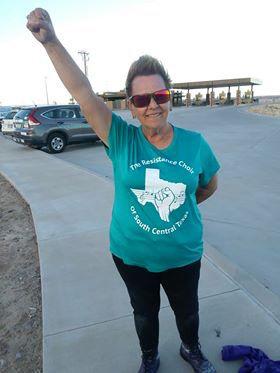
Cat Yuracka raises her fist at a gathering of activists.
‘We need warm bodies’
Cat Yuracka said that she discovered the “Witness: Tornillo” Facebook page, started by an activist from Brooklyn, Joshua Rubin, a few weeks before Election Day. Rubin is hoping to draw more people to Tornillo to create a more visible protest — a cause that Yuracka has joined.
“What we, as a nation, are doing to these children has been haunting me since last summer,” Yuracka said. She and her husband have an 8-year-old granddaughter, she said, “and continue to have night terrors” about what it would be like if their granddaughter were in the tent city.
The Yurackas and Zimmerman all encountered Rubin at Tornillo.
“When you pull up you see an unused toll booth that I thought was the border patrol checkpoint,” Zimmerman said. “Just past it was a parking area with lone man named Joshua Rubin who has been standing there as close as he can legally for over 40 days. Each day. He took off from work and I asked why and he said, ‘These are my children, these are your children.’”
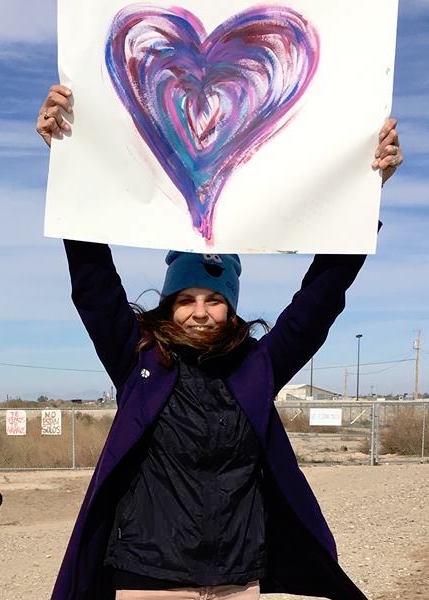
Erin Maloney from Missouri holds a sign.
Yuracka, who is part of the TX21 Indivisible group and The Resistance Choir of South Central Texas, said she intended to just drive down and figure out what the logistics might be for planning a long-term stay. She and her husband ended up staying for a couple of days and making friends with other activists on the scene. During a sing-along, Yuracka said, the activists’ voices carried into the camp.
“We heard some kids out playing soccer call back to us — that was all it took to ignite a mini-concert.”
Yuracka said the most important thing to do to bring awareness to the ongoing detention of children in Tornillo is simply to show up.
“We need warm bodies … and we need a sea of them,” she said. “It’s our only hope of bringing the national media back … which is our only practical hope of being able to shut this place down.”
After two years of activism, Yuracka said, “Still the most powerful tool I appear to possess is my ability to ‘be a warm body in the picture’ and my ability to convince others to do the same.”
Yuracka has reached out to other Indivisible chapters and recently posted on the Witness: Tornillo page that Indivisible El Paso is interested in gathering at Tornillo. Activists are planning a “Christmas at Tornillo” gathering.
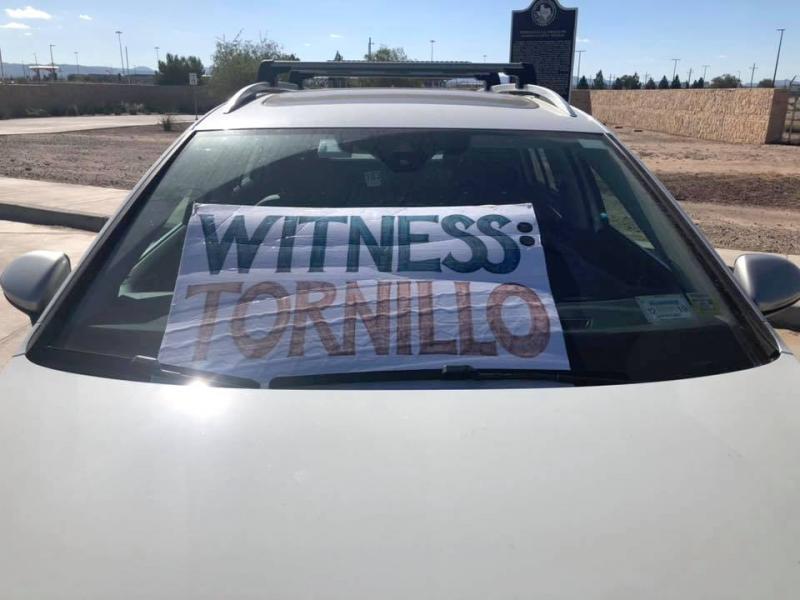
Joshua Rubin’s car, bearing a “Witness: Tornillo” sign in its windshield. Photo by Pete Zimmerman
Bearing witness
Zimmerman said that he did not travel to Tornillo to protest and that his protest will come in the form of a hand-delivered letter to his congressman. Instead, Zimmerman said, “I was there to witness something my heart and head say is wrong. That was my word as I went. People ignore protests more and more. So I was just there to witness, and to share of testify what I saw with the people I know in real life and on Facebook.”
Zimmerman said that when he first heard about children being kept in a tent city away from their families, it broke his heart. Then, he said, “Later on my way to Tornillo I thought of the scripture that says ‘let the little children come to me.’ But for a while I put that sadness on the shelf and forgot about it until I read that ‘dozens’ had protested at Tornillo. That was too few people for so massive the size of this heartbreaking situation. I knew then I had to go.”
Zimmerman said that as a clergyman he could have gone through the vetting process and gone in with other local leaders, but it would have taken months. He said he met a woman who had gone through that process and who said the children are well cared for physically, but she shared Zimmerman’s concerns about the emotional damage resulting from the children’s separation from their families.
“The simplest answer is this,” Zimmerman said. “If the kids being held have families here in the U.S., send them to family now. It’s the right thing to do.”
“I felt overwhelmed by this,” Zimmerman said. “So I went and learned. And witnessed. I have less anger and more hope now and it seems way less intimidating to find out what people and nonprofits are doing and see what I can do.”











